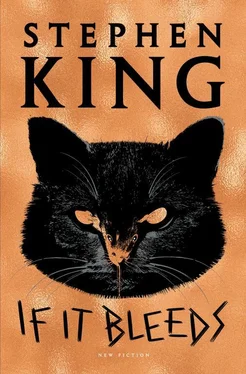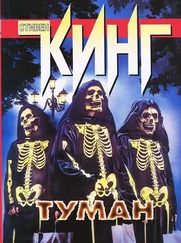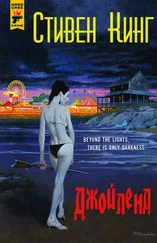“You could learn those moves,” she said. “You’re a natural, kiddo.”
He asked her once, when they were drinking iced tea after an especially strenuous go to Jackie Wilson’s “Higher and Higher,” what she had been like in high school.
“I was a kusit ,” she said. “But don’t tell your zaydee I said that. He’s old-school, that one.”
Chuck never told.
And he never went in the cupola.
Not then.
He asked about it, of course, and more than once. What was up there, what you could see from the high window, why the room was locked. Grandma said it was because the floor wasn’t safe and he might go right through it. Grandpa said the same thing, that there was nothing up there because of the rotten floor, and the only thing you could see from those windows was a shopping center, big deal. He said that until one night, just before Chuck’s eleventh birthday, when he told at least part of the truth.
2
Drinking is not good for secrets, everybody knows that, and after the death of his son, daughter-in-law, and granddaughter-to-be (Alyssa, sounds like rain), Albie Krantz drank a great deal. He should have bought stock in Anheuser-Busch, that was how much he drank. He could do it because he was retired, and comfortably off, and very depressed.
After the trip to Disney World the drinking tapered off to a glass of wine with dinner or a beer in front of a baseball game. Mostly. Once in awhile—every month at first, every couple of months later on—Chuck’s grandpa tied one on. Always at home, and never making any fuss about it. The next day he would move slowly and eat little until afternoon, then he was back to normal.
One night while watching the Red Sox get thumped by the Yankees, when Albie was well into his second sixpack of Bud, Chuck once more raised the subject of the cupola. Mostly just to have something to talk about. With the Sox down by nine, the game wasn’t exactly holding his attention.
“I bet you can see way past the Westford Mall,” Chuck said.
Grandpa considered this, then pushed the mute button on the TV controller, silencing an ad for Ford Truck Month. (Grandpa said Ford stood for Fix Or Repair Daily.) “If you went up there you might see a lot more than you wanted,” he said. “That’s why it’s locked, boychick.”
Chuck felt a small and not entirely unpleasurable chill go through him, and his mind immediately flashed to Scooby-Doo and his friends, chasing down spooks in the Mystery Machine. He wanted to ask what Grandpa meant, but the adult part of him—not there in person, no, not at ten, but something that had begun to speak on rare occasions—told him to be quiet. Be quiet and wait.
“Do you know what style this house is, Chucky?”
“Victorian,” Chuck said.
“That’s right, and not pretend Victorian, either. It was built in 1885, been remodeled half a dozen times since, but the cupola was there from the start. Your bubbie and I bought it when the shoe business really took off, and we got it for a song. Been here since 1971, and in all those years I haven’t been up to that damn cupola half a dozen times.”
“Because the floor’s rotted?” Chuck asked, with what he hoped was appealing innocence.
“Because it’s full of ghosts,” Grandpa said, and Chuck felt that chill again. Not so pleasurable this time. Although Grandpa might be joking. He did joke from time to time these days. Jokes were to Grandpa what dancing was to Grandma. He tipped his beer. Belched. His eyes were red. “Christmas Yet to Come. Do you remember that one, Chucky?”
Chuck did, they watched A Christmas Carol every year on Christmas Eve even though they didn’t “do” Christmas otherwise, but that didn’t mean he knew what his grandpa was talking about.
“The Jefferies boy was only a short time later,” Grandpa said. He was looking at the TV, but Chuck didn’t think he was actually seeing it. “What happened to Henry Peterson… that took longer. It was four, maybe five years on. By then I’d almost forgotten what I saw up there.” He jerked a thumb at the ceiling. “I said I’d never go up there again after that, and I wish I hadn’t. Because of Sarah—your bubbie—and the bread. It’s the waiting, Chucky, that’s the hard part. You’ll find that out when you’re—”
The kitchen door opened. It was Grandma, back from Mrs. Stanley’s across the street. Grandma had taken her chicken soup because Mrs. Stanley was feeling poorly. So Grandma said anyway, but even at not quite eleven, Chuck had a good idea there was another reason. Mrs. Stanley knew all the neighborhood gossip (“She’s a yente , that one,” Grandpa said), and was always willing to share. Grandma poured all the news out to Grandpa, usually after inviting Chuck out of the room. But out of the room didn’t mean out of earshot.
“Who was Henry Peterson, Grandpa?” Chuck asked.
But Grandpa had heard his wife come in. He straightened up in his chair and put his can of Bud aside. “Look at that!” he cried in a passable imitation of sobriety (not that Grandma would be fooled). “The Sox have got the bases loaded!”
3
In the top of the eighth, Grandma sent Grandpa down to the Zoney’s Go-Mart at the bottom of the block to get milk for Chuck’s Apple Jacks in the morning. “And don’t even think of driving. The walk will sober you up.”
Grandpa didn’t argue. With Grandma he rarely did, and when he gave it a try, the results weren’t good. When he was gone, Grandma—Bubbie—sat down next to Chuck on the couch and put an arm around him. Chuck put his head on her comfortably padded shoulder. “Was he blabbing to you about his ghosts? The ones that live in the cupola?”
“Um, yeah.” There was no point in telling a lie; Grandma saw right through those. “Are there? Have you seen them?”
Grandma snorted. “What do you think, hantel ?” Later it would occur to Chuck that this wasn’t an answer. “I wouldn’t pay too much attention to Zaydee. He’s a good man, but sometimes he drinks a little too much. Then he rides his hobby horses. I’m sure you know what I’m talking about.”
Chuck did. Nixon should have gone to jail; the faygelehs were taking over American culture and turning it pink; the Miss America pageant (which Grandma loved) was your basic meat-show. But he had never said anything about ghosts in the cupola before that night. At least to Chuck.
“Bubbie, who was the Jefferies boy?”
She sighed. “That was a very sad thing, boychuck.” (This was her little joke.) “He lived on the next block over and got hit by a drunk driver when he chased a ball into the street. It happened a long time ago. If your grandpa told you he saw it before it happened, he was mistaken. Or making it up for one of his jokes.”
Grandma knew when Chuck was lying; on that night Chuck discovered that was a talent that could go both ways. It was all in the way she stopped looking at him and shifted her eyes to the television, as if what was going on there was interesting, when Chuck knew Grandma didn’t give a hang for baseball, not even the World Series.
“He just drinks too much,” Grandma said, and that was the end of it.
Maybe true. Probably true. But after that, Chuck was frightened of the cupola, with its locked door at the top of a short (six steps) flight of narrow stairs lit by a single bare bulb hanging on a black cord. But fascination is fear’s twin brother, and sometimes after that night, if both of his grandparents were out, he dared himself to climb them. He would touch the Yale padlock, wincing if it rattled (a sound that might disturb the ghosts pent up inside), then hurry back down the stairs, looking over his shoulder as he went. It was easy to imagine the lock popping open and dropping to the floor. The door creaking open on its unused hinges. If that happened, he guessed he might die of fright.
Читать дальше








